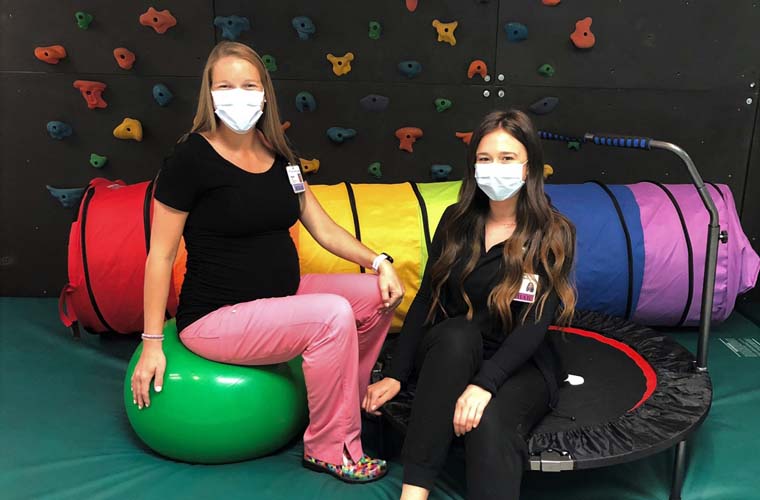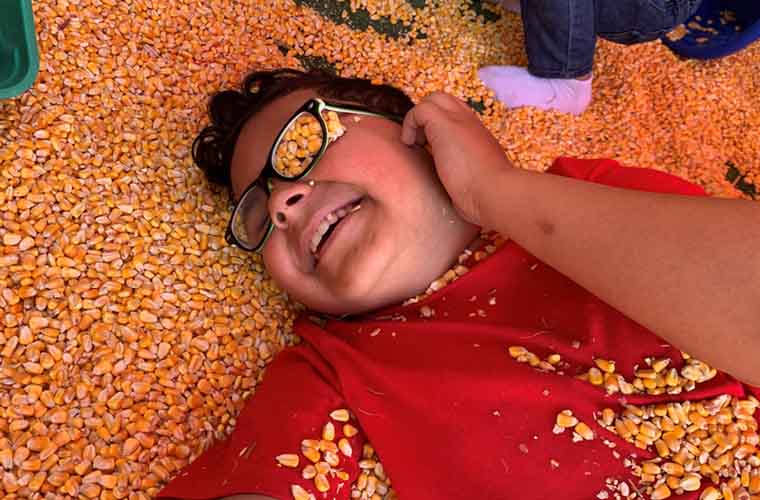BayCare Helps Families Support Children on the Autism Spectrum

Charmaine Muriel always knew her son, Jeremiah, was special. But as he grew up, she noticed he wasn’t meeting the same milestones as many of his peers. Jeremiah’s speech was slow to develop. He began repeating words and fixating on objects. Charmaine researched his symptoms and stumbled upon autism spectrum disorder (ASD), a broad condition that can affect how a person interacts with others, communicates, learns and behaves.
“I didn’t know what autism was back then,” said Charmaine, a nurse in the emergency department at St. Joseph’s Hospital. She was overwhelmed with information but determined to help her son.
One day at the park, another mom helped Charmaine realize her family wasn’t alone. Not only did this mom have a child on the autism spectrum, but she told Charmaine about local services available for families like hers. It came as a revelation.
“At the time I wasn't aware of medical interventions for children with autism,” Charmaine said. “But there are so many resources right here in the community that parents of autistic kids can take advantage of.”
BayCare Kids offers many services for pediatric patients with autism. From sensory bubbles in our emergency rooms to specially trained therapists and behavioral health professionals, BayCare works with autistic patients and their families to improve their quality of life. Speak to your pediatrician if you're interested in learning more about services that might be right for your child.
The BayCare Kids Specialty Center at Mease Countryside Hospital is one place families can find support. As occupational therapists, Hannah Lybarger and Carly Skonieczka help their patients develop skills required for activities of daily living, or ADLs. About half of their patients are on the autism spectrum. ADLs include mundane tasks like getting dressed and going to the bathroom—things that can be tough for children with autism. But for Hannah and Carly’s patients, developing ADLs usually starts with playtime.
“One of the first things we do is work on building a rapport with the child through play, finding their interests and working with the families to determine their sensory needs,” Hannah said.
Sensory bins at the BayCare Kids Specialty Center are filled with all sorts of tactile and technicolor objects—rice, beans, shaving cream, sand—which children can explore through play. By monitoring how kids interact with the sensory bins, Hannah and Carly get a better idea of their sensory needs.
“Some kids are easily overstimulated by sensory experiences, while others seek them out,” Hannah said.
Hannah and Carly help identify what types of sensory input each child needs to encourage optimal attention, self-regulation and success in their home, school and community. They educate parents on how to integrate this into their daily lives, along with ways to help their child process sensory input that can be overwhelming, such as loud noises, clothing textures, movement and tactile sensations. They then use what they've learned about the child to break down tasks they find complicated. Parents learn how they can help their kids with routines that make their everyday tasks more manageable.
Working with children on the autism spectrum is a collaborative effort that sees occupational therapists partner with physical therapists and speech therapists like Coleen Ritari.
“Speech and language are very complicated and there are so many things that go into understanding language,” said Coleen, a speech language pathologist at St. Joseph’s Children’s Hospital. “For our children on the autism spectrum, we may spend more time on the social aspects of language or pragmatics like eye contact, facial expressions, tone of voice and volume. We evaluate each child’s needs and write individualized plans of care.”
There’s a saying in the autism community: If you meet a person with autism, you’ve only met one person with autism. In other words, everyone on the autism spectrum is different. That’s why care and treatments are specific to each patient. This can sometimes pose a challenge for parents and therapists like Coleen, Hannah and Carly, because there’s no cookie-cutter approach to care. But the payoff when a patient makes progress is immense.

“Some autistic children have a tough time expressing themselves,” Carly said. “That can be very frustrating for them. But when you find ways that help a child express themself and feel comfortable in their own body, it’s such a rewarding feeling.”
Charmaine knows that feeling well. She spent six years earning her nursing degree while raising Jeremiah with her husband and discovering there isn’t always a roadmap for raising a child on the autism spectrum. Now, as Jeremiah meets milestones and conquers new tasks, she’s flooded with pride in his progress.
Jeremiah turns 11 this year. He’s reading and learning to ride a bike and tie his shoes. He recently started asking Charmaine about her day when she picks him up from school—something she wouldn’t have imagined a few years ago. Hearing him initiate conversations warms her heart and fills her with joy.
“This experience has humbled me,” Charmaine said. “I learned to be patient with myself and patient with Jeremiah. I still get excited because he continues to meet milestones. I'm amazed by these little things that we tend to take for granted."


